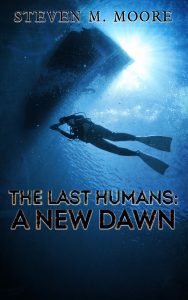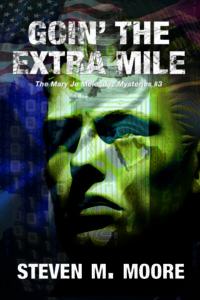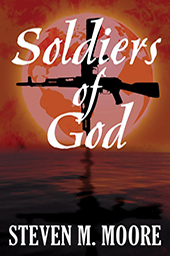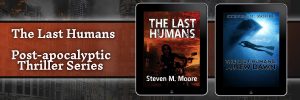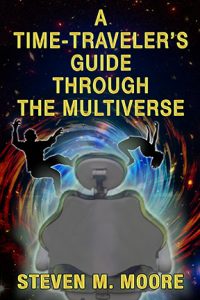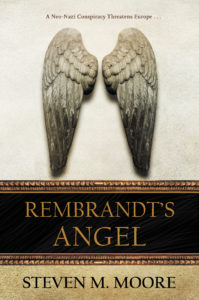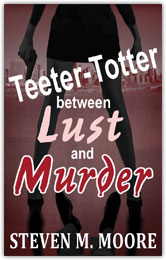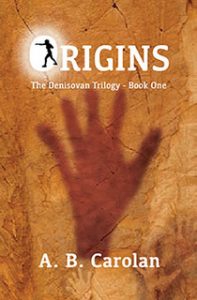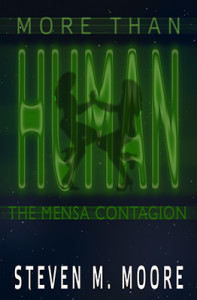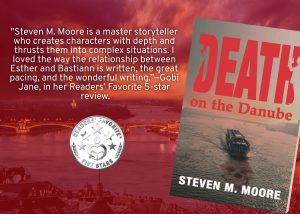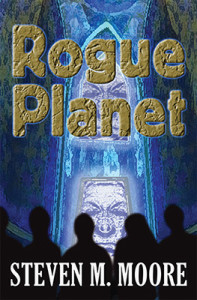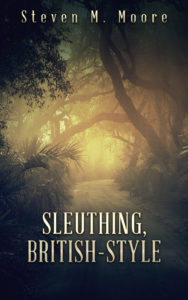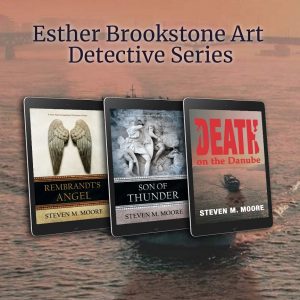[As a native son of the great state of California, I can emphasize with Irwin Pound’s sentiments found in this short novella (or long short story?). My distance from my current home in Montclair to California is farther than his distance from London to the Lake District, but the yearning is probably just as strong. I hope you enjoy this story, another British-style mystery, which concludes today. (For previous chapters, see the “Friday Fiction” archive.)]
The Prodigal Son
Copyright 2021, Steven M. Moore
Chapter Ten
The next morning at the station, Robert’s team began casting a wider net. Sara Bixby was the primary person-of-interest now—not yet a suspect, but someone who might be able to offer a lot of answers to their questions. Because Robert and company had it covered, Irwin called in some favors in Southampton. He had been on a case there once and become friends with a DCI and a few other plods at that shipping and passenger port.
“We can make it a formal request from the coppers up there, mate,” Rory McAdams told him. The DCI’s brogue showed his work in southern England was farther from his homeland than Irwin’s had been in London.
“Has to be unofficial. I’m here as a guest, you know. Do you have someone who could check the victim’s finances on the sly?”
“Thinking that your missing woman felt that her daddy dearest was after her inheritance, are you?”
“That’s always a possibility. People with money, want more. And, just because he had money, doesn’t mean he didn’t want more, although maybe he had some bad habits too—gambling, drugs, you name it. Maybe someone could check that out too?”
“I have a hotshot DS who’s closing a case and will have a bit of time to kill while she waits for her promotion to DI. She’s like a bloodhound, she is. Brother is too. We have to watch out for these young plods, Irwin, my friend.”
He laughed. “That might be how Mills feels about me.”
“Say hi to that old fellow. He’s one of the good ones.”
“I know.” Irwin saw the shadow on his borrowed desk. He looked up to see Toby. “Be right with you, lad.” The fellow took a chair and waited. After Irwin rang off, he said, “Okay, what can I do for you?”
“We have a CCTV record of her at a rest stop on A74.”
“Love those cameras. Sounds like she’s heading for Glasgow. Did you check other stops farther along that route?”
“In the process of, sir. Wondered if you knew if she had anyone up there who’d hide her.”
“If she’s guilty, it’s to hide; if not, maybe visiting a relative or friend and oblivious with respect to our search. Let me check with her aunt.”
Eleanor Bixby picked up on the third ring. “My second cousin Angus is up that way. Don’t know of anyone else from the family she might visit—not many left—but she was always secretive about her trysts with questionable men. It could be anyone. Angus is a publican; not the pub’s owner, but he runs the place. The Lonely Stag it’s called, a bit north of the city.”
“Are your people Scotch?”
“Heavens no. We’re ex-pat Londoners, Cockneys to be precise. James was always looking even farther south, but most of us here in Cumbria look north, if they’re not Vikings gazing across the North Sea.”
“I see. Thanks for the information.”
Irwin rang off and went to talk to Robert.
***
“I know a plod up in Glasgow,” Robert said. “He owes me a favor. I’ll call him. Can you call that damn lawyer and ask him point blank if this Angus is in the will. I can’t think of any other reason for Sara to go up there, unless the publican is her new surrogate father.”
“I’ll do that. I also have some feelers in to a friend in the Southampton area. What would we do without them?”
“If you do this work long enough, you come to depend on friends and a network of questionable blokes who’re willing to grass on anyone to increase their dosh. That’s how you play the game.”
Irwin smiled, nodded, and returned to the common area.
Only moments after he sat, he received a call from Rory.
“Told you that our DS is gung-ho. Your victim was bleeding money. His company forced him to get help with his problem with drugs, and he owed money for bad bets at the race track. They’ve removed him from the payroll now, of course.”
“So he wouldn’t want his daughter to make life difficult for him in probate. He might even have been thinking of going after the aunt’s share too. Thanks. Give your DS a peck on the cheek for me.”
“That would get me a good slap or two. We’re even now, mate.”
“I wasn’t keeping score.”
“I was.” Irwin went silent. “You there? Just kidding, old stick. Good luck with this one.”
Irwin called the barrister. The combative receptionist told him he had gone to an emergency meeting in Glasgow. He went to talk to Robert.
***
“Um, Sara’s headed to Glasgow, Leam’s headed there. Think that’s a coincidence?”
Irwin shook his head. “I think your friend there better send someone to check on Angus. I suspect he’s in the will too.”
“You’re thinking we have it all wrong? That she’s conspired with the barrister to take all the mother’s money. Maybe the story about her making a nuisance of herself at the law office was just a lie.”
Irwin now nodded. “Something like that. Or maybe Eleanor’s cut is miniscule, and Sara is still fond of her aunt, even though she really doesn’t want her to have all the money. The aunt lives comfortably.”
“I’ll make the call to my friend. You try to call this Angus.”
“We’d better warn Eleanor too.”
“Do that after warning Angus.”
Irwin was getting a lot of exercise with the back-and-forth between Robert’s office and the common area. Once there, he called Toby over and asked him to find Angus’s contact information. He then called Eleanor.
“Eleanor, you might be in danger, so I wanted to give you a heads up. Do not let Sara or the barrister into your house if either appears.”
“What’s going on? Did you find Sara?”
“In a way. She’s heading for Glasgow now. So is Mr. Leam. I need to ring off and warn Angus.”
“I don’t believe this! Sara’s a hellion, but she’s not a murderer! You plods must be thinking she killed her father.”
“It’s a possibility. We have to sort this out, but it’s better to be safe than sorry. I’m going to send two constables out to stay with you until we do sort it. Have them show their warrant cards, of course.”
“I guess I’d better get the tea and cakes ready.”
Irwin had just disconnected when Toby handed him a note with the publican’s contact information.
***
“Lonely Stag. This is Angus.”
“Good I caught you, Mr. Bixby,” Irwin said. He explained that he was an inspector from Scotland Yard. “You might have some visitors, hopefully in this order: Some constables from Police Scotland to protect you, and Sara and Mark Leam, who we think mean to do you harm.”
“Are you batty? Sara’s a distant relative. She and that barrister friend are doing a holiday getaway to say hi to Nessie. They’re stopping in to say hello. I had their call just before yours. Figured I’d give them some pints and a few sandwiches when they arrive. I’m only here ’cause I’m already on the job, making ready for late afternoon and evening festivities.”
“Do you happen to know if you’re in Janet’s will?”
Angus thought a moment. “Hell if I know. Years ago Janet told me she was splitting everything between Eleanor, Sara, and me, with that lout of a father forced to be Sara’s conservator. Heard she died but heard nothing about no will, so I assumed she changed it.”
“Apparently not. It’s possible that Sara wants it all for her and her barrister friend.”
“That sounds almost like slander, mate. Do you have evidence for that?”
“For now, it’s a theory, but it’s better to be safe. Ask to see the constables’ warrant cards if they arrive first. In any case, if Sara and that lawyer show up, be careful.”
“Okay. Just to be complete, give me your full name, warrant card number, and location.” When Irwin gave him the latter, Angus said, “A Yard DI and you’re in that poor excuse of a police substation in Cumbria? Why’s that?”
“Cumbria is where James Trent was murdered.”
There was a silence for a moment. Then: “I see. Damn. Okay, I’ll be careful.”
Chapter Eleven
Sara Bixby had hated her father, so she felt no loss. He had walked out on her mother when she was a baby. Of course, he’d come back when he needed something from her. It wasn’t good enough for him that her mother was dead and could do him no harm. He wanted to prove paternity to get Sara’s inheritance too? Sod that!
All her life her mum and she’d struggled while that fat cat got rich. The rich want to get richer, even at the expense of their progeny. Of course, she didn’t know how rich James Trent actually was, but VP in a shipping company? Her mum had ended up well off too, but that was besides the point.
She’d learned he was a twitcher. Maybe someone else had known that? What better way to draw him up the mountain where there’d be a fatal accident! She’d stared at the headlines. There was a witness, some plonker named Irwin Pound. Maybe that prat had sorted things. Otherwise, the plods might try to pin the murder on her.
She’d met Mark at the second rest stop. Once she made a deal with the attendant to park her car there, they continued on to Glasgow. They both thought a good holiday north of the border would relax them a bit before the probate battles began. Why is Eleanor being such a hard ass? And who killed her father? All of this was so confusing. She was lucky that Mark was good at calming her down.
She loved Eleanor who, in many ways, had been more of a mother to her than her own mum. The latter had become distant over time, concentrating more and more on her business interests. Sara thought all that stress might have given her cancer, but maybe that wasn’t medically sound? In any case, it hadn’t helped after she was diagnosed to have that stress added to that of dealing with the Big C.
“You’re quiet.”
“Just thinking. You met that fellow Irwin Pound, right?”
“Forget about that. He’s a copper too. You’d think he’d be the best witness the plods ever could have, but I guess he couldn’t identify your father’s killer. I blew them off. None of this is any business of theirs. We’re almost there, by the way.”
“Thank God. I could use a pint.”
***
Sara greeted Angus with a hug; Mark shook the uncle’s hand.
“Not much action here right now,” he said. He nodded towards the two at the table. “Couple of plods there wasting the taxpayers’ money, that’s all. A few pints to start?”
They nodded, and Angus joined them.
“Is this about Janet’s will?” Angus said.
Mark eyed Sara but then smiled at Angus. “Not really. I am handling that probate case, which will take forever, I dare say, but no, we’re just on a holiday together. Nessie beckons. We needed a break from all the Cumbrian intrigue.”
“I see. So Janet never wrote a new will?”
“Same one’s been in effect since just after Pops left,” Sara said. “She never had time. Eleanor basically raised me. You know that.”
“Good old Eleanor. She’s a strange one, but I guess she’s good-hearted.” Angus glanced at the rozzers. “I think she’d have killed James if she ever saw him again.”
“Not auntie,” Sara said. “I know she didn’t like pappy. Told my mum so before she married him, my mum would say. Her only failing was being a bit strict with me. Wanted to screen every man I was interested in.” She clasped Mark’s hand. “I had to get away. She didn’t like lawyers either.”
“Aye, but we can still toast her,” Angus said, raising his mug.
As if that were a cue, Eleanor Bixby entered the bar. The constables sent by Robert’s friend moved towards her, but she had a shotgun. She took out both of them and then reloaded, pointing the gun towards the table.
“You’ve made it so easy for me, Sara.”
***
Bobby MacGregor had decided to visit The Lonely Stag on his way home to see how his constables were doing. He figured Mills had gone down a cul de sac on this one. He’d have a few pints with the boys, laugh about it, and maybe call his old friend to give him a bit of lip. But he saw the woman with the shotgun from the window as he came around from the car park.
Mills was nae wrong. Trouble’s a-brewin’. Then Bobby saw his two constables bleedin’ from all over their bodies. Bollocks!
His thoughts went into overdrive. He knew Angus well. Could he catch his eye? Between the two of them, maybe they could disarm the old hag. That assumed the constables had been caught by surprise. Angus and he needed to create one for the old witch.
He waved both hands. Angus saw him through the window. He pointed to the door. Angus nodded.
Bobby burst through the door yelling, “The dart master’s here!”
Eleanor tried to swing around. It was Mark Leam who smacked the shotgun upwards, spoiling her aim. Then Angus tackled her just like in his old rugby days.
Sara broke down; Mark tried to comfort her. Bobby called his station for backup, pathologist, and SOCOs, while Angus kept his cousin pinned down.
Chapter Twelve
Irwin was allowed to be an observer at the interrogation a day later when the extradition process with Police Scotland was complete. They had everyone but Eleanor Bixby’s statement on record by then, thanks to Bobby MacGregor. The four others would be witnesses at the trial, of course. So would Irwin.
Bobby hadn’t wanted to interrogate Eleanor. Irwin couldn’t blame him. The Scot had the terrible task of telling the two constables’ families about their loved ones’ demise. That was more motivation for Robert Mills to make sure Eleanor would spend the rest of her life in prison. He scowled at her lawyer, a man he normally respected but considered an enemy at the moment.
Eleanor had confessed nothing. Her short time in jail there and the trip south might have changed her mind about talking. She sat with head tilted down toward the scarred table top. Robert and Tim faced her. Irwin sat in the corner, deciding to say nothing unless asked.
“Eleanor, you can help your situation if you talk,” Robert said after informing her of her rights yet again and stating names of those present for the taping. “We know you had your reasons for committing these crimes. If you admit to them and explain them, it will be in the record. Otherwise, you will receive the full punishment for them that the Crown provides.”
She glanced at her lawyer. He shrugged. He’s probably thinking this was a waste of time. With five witnesses against her for three murders and two or three attempted ones, he probably thinks hers is a lost case, Irwin thought.
“Please be more specific,” she said to Robert.
“I can’t be,” he said. “It’s not my decision. It’s the Crown Court’s. But in cases like this, they consider all pertinent information.”
She nodded and began a tale of woe filled with hate and frustration. She’d killed James. She’d been wondering how to do that ever since she’d learned what was in Janet’s will, a three-way split between her, Angus, and Sara, the latter via the conservatorship. It had enraged her that her sister preferred James to her for taking care of her daughter. Eleanor had taken care of Janet’s brat for many years, after all. She’d then went on to conclude she deserved it all.
James had set things in motion. She knew the lout was only interested in Sara insofar as he could drain all of Sara’s assets. He’d even asked Eleanor to help him ensure that the probate went his way. After thinking about it, she contacted him, impersonating Sara, and lured him to that ledge where she revealed herself and killed him.
The next part of the plan was to find a way to kill Sara and Angus. She’d learned about Sara and Mark’s little holiday in Scotland and suggested they visit Angus and say hi. Her niece had always liked the old publican, perhaps because he was a kindred spirit. Mark Leam would have just been collateral damage in the old woman’s plot.
At the end, Eleanor broke down, shedding tears of rage. Irwin knew he was observing extreme mental illness. That might be Eleanor’s best defense. She needed a better lawyer to pull that off. Would it be out of place for me to suggest that to Sara, now sole heir of her mother’s estate, to provide such a barrister?
***
“So…did you make that suggestion to Sara?” Devon said, putting her glass of wine down and smiling at Irwin, her smile enigmatic as if she’d discovered a secret.
“And she will act upon it. She loves her aunt despite everything that happened. Believes Eleanor needs a good psychiatrist as well and not necessarily time in jail. We agreed the latter would only make her worse right now. Who knows what the Crown Court decides and whether that same mental help will put her in jail after all when she’s declared sane.”
“Yes, if she gets well, they might still put her in jail. You’ve done your best.” She patted his hand. “And I think it’s typical of you. We both care. How is Sara, by the way?”
“Still stunned a bit. She had no idea all this was going on, apparently. I hope that top barrister won’t think hiring him is a guilt trip because she did. I told her to blame me in that case. Mark is good for her, I suppose. He might be a slimy lout, but if anyone can bring her out of her funk, he can. That funk occurs a lot when someone tries to kill you, of course, especially when it’s someone you love. It has to create doubts about whether that person really loved you at all.”
Irwin eyed her as she took another sip of wine, her eyes over the rim of the glass twinkling at him. “I’m going to be a bit bold and make a suggestion for dessert,” he said.
“We don’t have dessert menus yet. You can’t have been here before. This place only opened three years ago.”
“I was thinking of dessert at your place. The amorous kind.” He smiled. “Isn’t your mum at your aunt and uncle’s. Up to you.”
“That’s a good suggestion. We’ll see where my mind’s at after dinner.”
Her enigmatic smile gave him some hope.
***
A month later, Irwin stepped off the train and saw Robert Mills waiting for him. “Welcome back. Come along with me. That real estate lady is waiting for you.”
As they drove to the new development not far from the station, Irwin wondered how to begin a conversation.
“I suppose you wouldn’t have done it,” he finally said.
“Done what? Buy a condo unit when you might need a house down the line. It’s always a good investment. In the worst case, you could pay it off just by renting it out to tourists one or two weeks at a time when they come north to play in the Lake District. It’s a lot cheaper for them than paying for an inn or a hotel, or the Cotswolds, for that matter.”
“Nice speech. I meant pulling up stakes in London to take a lower position here.”
“Are you blaming me for that. Harry will be retiring in eight months. That’s a DI position opening up. Our DCI likes you, lad. And with your background, you’re way ahead of any other candidate. Assumes you can stand working with me for eight months, of course.”
“Did you give Tim my best?”
“An even exchange from his point of view, but I think he’ll get tired of London. Like you, there’s too much of Cumbria in that boy. That’s it, isn’t it?”
“Most of it. I want to see if my relationship with Devon blossoms a bit.”
“Take that slow. You both have tough jobs. In a sense, that’s good. Couples who see too much of each other can get on each other’s nerves.”
Irwin smiled. “But the prodigal son still needs to return home, no matter what happens.”
***
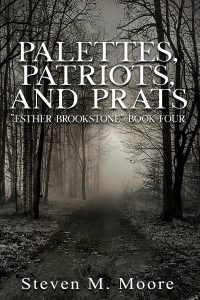

Comments are always welcome.
Two more “Esther Brookstone” novels. Did you miss them? Maybe you thought Esther’s adventures ended with the story of her honeymoon with Bastiann, Death on the Danube? No, there are more adventures involving crimes back in merry old England after the couple returns home. In #4, Palettes, Patriots, and Prats, they befriend an American artist, only to find there’s a lot more to her troubles than expected. In #5, Leonardo and the Quantum Code, everyone wants to steal new algorithms for quantum computers based on ideas of Leonardo Da Vinci. If you love the idea of 21st versions of Miss Marple (Esther) and Hercule Poirot (Bastiann), don’t miss any of the books in this series.
Around the world and to the stars! In libris libertas!
